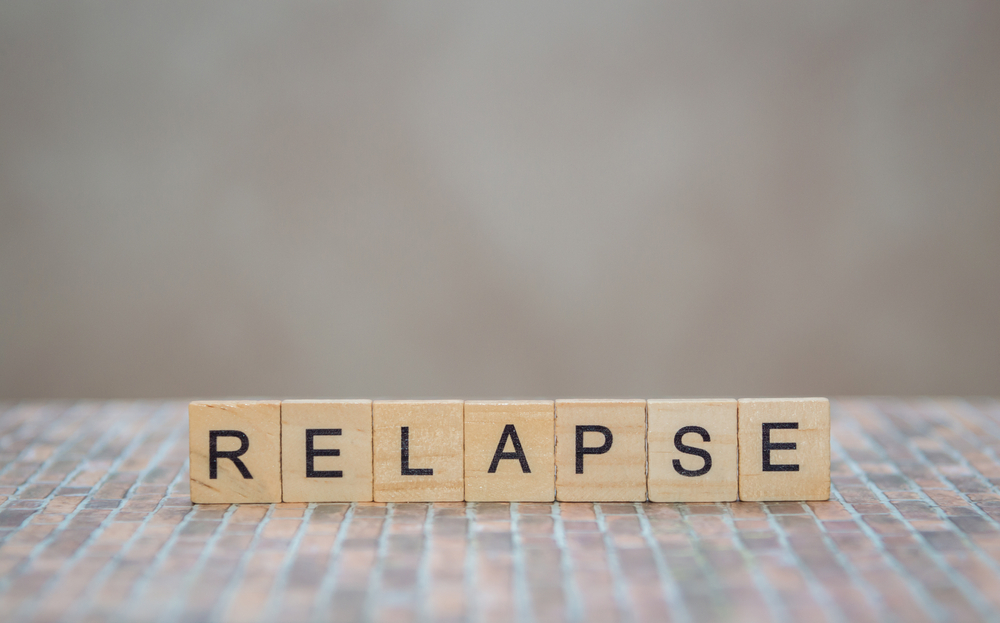Last Updated:
September 18th, 2025
Developing skills to prevent relapse is a critical component of sustained recovery. Yet on every person’s recovery journey, there are times when the battle to remain sober feels too hard to fight.
A relapse never marks the end of a recovery journey, but it is always best to defend yourself against the urges to relapse when planning long-term recovery.

What exactly is relapse?
The word relapse was originally used in medical settings to describe a health condition that gets worse after previously showing signs of improvement. It’s a term used by caregivers when treating cancer patients who show positive signs of improvement before sadly slipping back into a deteriorating state.
In terms of addiction treatment, a relapse happens when a person returns to drinking or substance use after a period of cessation. You may have heard it expressed more colloquially as “backsliding” or “falling off the wagon,” as substance use is resumed after someone makes positive changes.
When a person relapses, they can feel utterly heartbroken, as though they have shattered the most important promise in the world, a promise made to themselves that they will stop taking a substance and treat themselves better.
Here, it becomes important to understand that relapse is not a failure that cannot be recovered from. The path to recovery is marked by steps in all directions, some of which will be steps backwards. The most important thing is how we react and get back up after we fall.
The most common times for relapse to happen
The factors that contribute to the chances of relapse occurring are varied. Some people can return to drug use with minimal external influences after they’ve removed every temptation that might contribute to relapse. Other people manage to steer clear of relapse even in the harshest of circumstances, surrounded by shadowy temptations to return to the drug.
Research indicates that around 85% of people with a substance use disorder (SUD) will relapse within the first year of recovery. In this timeframe, the development and maintenance of resilient and healthy coping mechanisms is a matter of urgency.
Further research suggests relapse rates as high as 70% in the 90 days following addiction treatment, adding to the significance of relapse prevention in the “early recovery” period.
Relapse in three stages
Many people hold a belief that relapse is a quick process, with one brash decision that undoes all progress made. More often than not, relapse is actually a slow process, with leading research suggesting that the foundation of relapse is laid in three stages.
For a person striving to stay sober, it can help to be aware of how relapses can form slowly. The three stages of relapse are:
Stage 1: emotional relapse
Emotional relapse is the first stage and can form almost subconsciously, without the person actively thinking about returning to drugs or alcohol. Darkly underscoring this phase are emotions and behaviours that lay the groundwork for temptations that lead to potential relapse. Some of these emotions and behaviours include:
- Self-isolating away from friends and family
- Worsening diet and sleeping habits
- Mood swings
- A refusal to ask for help
- An inability to have fun while sober
- Not having healthy outlets for anxiety and anger
Stage 2: mental relapse
Progressing to the second stage, a person faces increased stress and mental struggles. Intensifying thoughts and actions lead them closer to the edge of relapse, often setting the stage for a tragic and futile conflict within themselves on whether or not to return to the substance. Signs of mental relapse can include:
- Deepening withdrawal from social groups
- Downplaying the consequences of returning to the substance
- Mentally planning for the last phase (physical relapse)
- Creating new, unrealistic beliefs about the positives of using the substance
Stage 3: physical relapse
The final stage of relapse is when a person actually partakes in using the substance again, at similar or matching levels of previous use. One of the greatest threats of physical relapse is the risk of overdose if a person uses the same amount as they did before the period of abstinence.
While previous levels of substance use may be restored, it’s important to remember that a person can use a smaller amount, then return to cessation and successfully stop again. This is called a “lapse,” and it involves a single or minor instance of using a substance again before returning to the original goal of cessation.
What steps can I take to reduce the risk of relapse?
When you’re in recovery, the idea of relapse can feel overwhelming—especially if you’re still working through the physical, emotional, and psychological challenges that addiction brings. It’s important to remember that recovery is a process, not a one-time event.
Relapse doesn’t mean failure, but it can be a setback. That’s why having practical strategies in place is key. Staying committed to recovery takes ongoing effort, self-awareness, and support, but you don’t have to do it alone.
At UKAT, we’re here to support you every step of the way. Here are some helpful steps you can take to reduce the risk of relapse and stay focused on long-term recovery.
Friends and close family may be a great source of inspiration for remaining sober. Organise get-togethers and mention that the purpose of seeing them is not for drinking. If you’re concerned that urges will be too great among people you used to drink with, find places that have support groups with people who have been or are currently in the same situation as you. Remember, there is strength in numbers and isolating will not help in the long term.
There will be times in recovery when you feel deeply shaken or troubled by a matter beyond body or mind. Of course, each person’s spirituality and religion are highly personal, but there may be times when seeking faith in a higher power brings profound peace. You may find prayer in your own way and lean into spiritual support to sustain your efforts to avoid relapse.
Journaling can become a cathartic outlet for rushing emotions. Try writing daily or weekly logs of your feelings and come back to them every so often. This will help contextualise the way your mind adapts to newfound sobriety. Further acts of self-care, like deep cleaning and decluttering your living space, can be extremely valuable. Showing kindness to yourself in body, mind and spirit will help you stay strong in the face of urges to relapse.
Where can I get help for my addiction?
The risk of relapsing after making progress may feel terrifying. It can sometimes feel like cravings are waiting for you around every corner. What matters most is remembering that you’re not alone on your journey.
At UKAT Liberty House, we understand the intricacies of overcoming addiction and staying sober for good. Our treatment programmes are tailored to support you at every stage, from medical detox to long-term relapse prevention. Our facilities strengthen your chances of complete recovery, and aftercare systems are in place to keep you strong, even at the toughest of times.
Contact us today to take the first step on your journey and regain control of your life, healthier and free from addiction.





